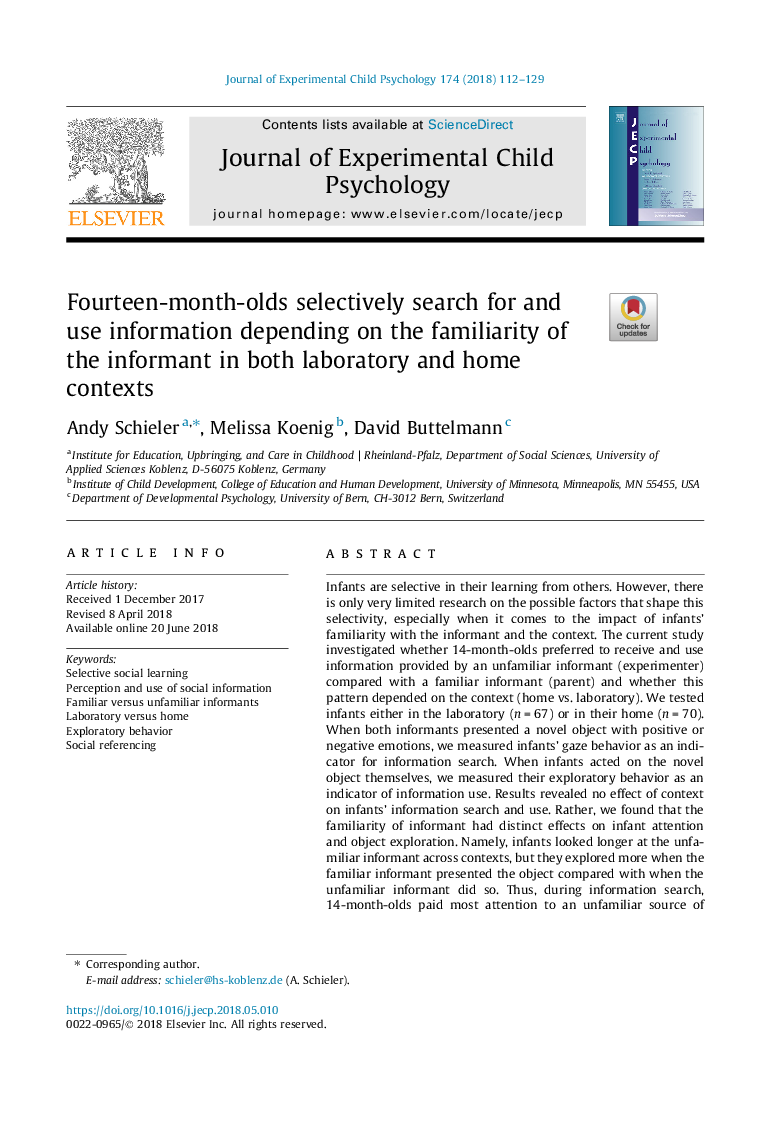| کد مقاله | کد نشریه | سال انتشار | مقاله انگلیسی | نسخه تمام متن |
|---|---|---|---|---|
| 7273722 | 1473438 | 2018 | 18 صفحه PDF | دانلود رایگان |
عنوان انگلیسی مقاله ISI
Fourteen-month-olds selectively search for and use information depending on the familiarity of the informant in both laboratory and home contexts
ترجمه فارسی عنوان
چهارده ماهه به طور انتخابی به جستجوی و استفاده از اطلاعات وابسته به آشنایی آگاهانه در زمینه آزمایشگاه و خانه
دانلود مقاله + سفارش ترجمه
دانلود مقاله ISI انگلیسی
رایگان برای ایرانیان
کلمات کلیدی
یادگیری انتخابی اجتماعی، ادراک و استفاده از اطلاعات اجتماعی، آگاهان نسبت به غیر آگاهان، آزمایشگاه در مقابل خانه، رفتار اکتشافی، ارجاع اجتماعی،
موضوعات مرتبط
علوم انسانی و اجتماعی
روانشناسی
روانشناسی رشد و آموزشی
چکیده انگلیسی
Infants are selective in their learning from others. However, there is only very limited research on the possible factors that shape this selectivity, especially when it comes to the impact of infants' familiarity with the informant and the context. The current study investigated whether 14-month-olds preferred to receive and use information provided by an unfamiliar informant (experimenter) compared with a familiar informant (parent) and whether this pattern depended on the context (home vs. laboratory). We tested infants either in the laboratory (nâ¯=â¯67) or in their home (nâ¯=â¯70). When both informants presented a novel object with positive or negative emotions, we measured infants' gaze behavior as an indicator for information search. When infants acted on the novel object themselves, we measured their exploratory behavior as an indicator of information use. Results revealed no effect of context on infants' information search and use. Rather, we found that the familiarity of informant had distinct effects on infant attention and object exploration. Namely, infants looked longer at the unfamiliar informant across contexts, but they explored more when the familiar informant presented the object compared with when the unfamiliar informant did so. Thus, during information search, 14-month-olds paid most attention to an unfamiliar source of information. However, participants explored the objects more when they came from a familiar source than when they came from an unfamiliar one. Possible explanations for these findings are discussed.
ناشر
Database: Elsevier - ScienceDirect (ساینس دایرکت)
Journal: Journal of Experimental Child Psychology - Volume 174, October 2018, Pages 112-129
Journal: Journal of Experimental Child Psychology - Volume 174, October 2018, Pages 112-129
نویسندگان
Andy Schieler, Melissa Koenig, David Buttelmann,
